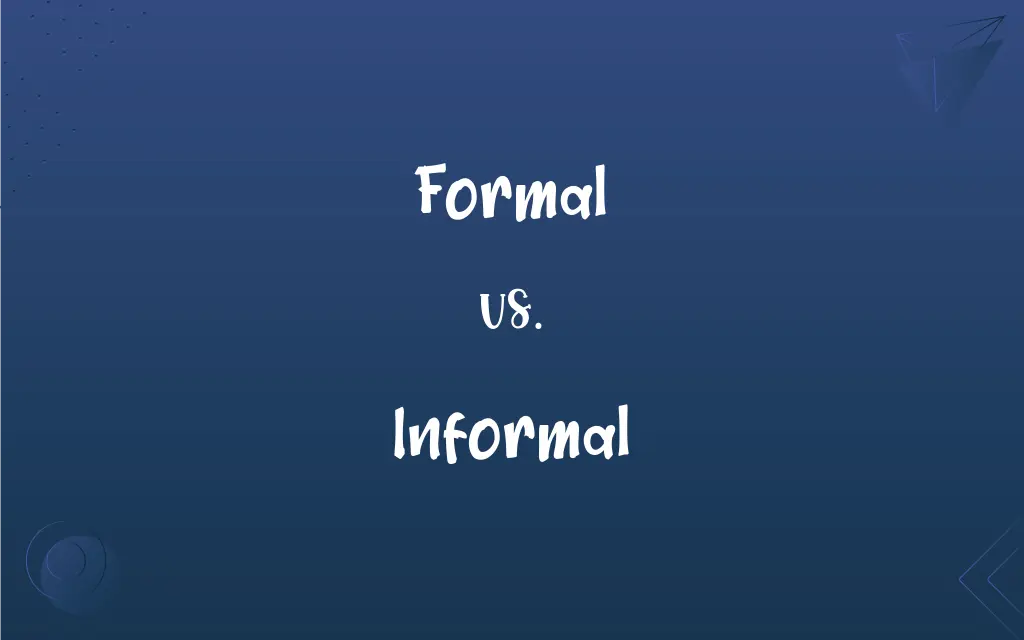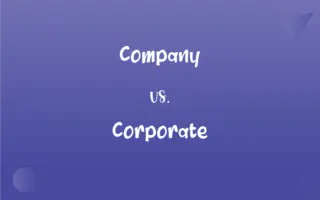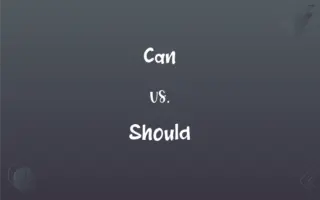Formal vs. Informal: What's the Difference?
By Janet White || Published on December 14, 2023
Formal refers to actions or styles that are official, structured, and conform to established rules, while informal denotes casual, relaxed, and non-official practices.

Key Differences
Formal communication adheres to established conventions and is often used in professional or official settings. Informal communication is casual, using colloquial language and is common in personal conversations or casual encounters.
Formal dress code includes suits, dresses, and attire suited for official or ceremonial occasions. Informal dress is casual wear, like jeans and T-shirts, appropriate for everyday use or relaxed settings.
Formal events are structured, with specific protocols and etiquette, such as official ceremonies or business meetings. Informal events are casual gatherings, like family get-togethers or outings with friends, with no strict rules of conduct.
Formal writing uses a structured, precise language, following standard grammar and style rules, often seen in academic or official documents. Informal writing is relaxed, conversational, and may include slang, used in personal letters or social media.
Formal behavior follows established social norms and etiquette, often seen in professional or traditional settings. Informal behavior is relaxed, spontaneous, and free from rigid social protocols, typical in comfortable social circles.
ADVERTISEMENT
Comparison Chart
Communication
Structured, follows conventions
Casual, uses colloquial language
Dress Code
Suits, formal dresses
Casual wear like jeans, T-shirts
Events
Official ceremonies, business meetings
Casual gatherings, outings with friends
Writing Style
Precise language, standard grammar
Conversational, may include slang
Behavior
Adheres to social norms and etiquette
Relaxed, spontaneous
ADVERTISEMENT
Formal and Informal Definitions
Formal
Pertaining to official or ceremonial occasions.
He wore a formal suit to the diplomatic meeting.
Informal
Using everyday, conversational language.
His informal speech was filled with local slang.
Formal
Related to or used in ceremonies.
The awards ceremony was a formal event.
Informal
Free from strictness or formality.
The dress code for the event was informal.
Formal
Following a specific format or set of rules.
The formal debate followed a strict time schedule.
Informal
Acting without formal planning.
Their informal gathering was a spontaneous decision.
Formal
Suitable for professional settings.
Her formal presentation impressed the board members.
Informal
Not official or formal.
They held an informal meeting in the café.
Formal
Adhering to established customs or norms.
Their formal wedding followed all traditional practices.
Informal
Relaxed and not bound by formalities.
The party had an informal, friendly atmosphere.
Formal
Relating to or involving outward form or structure, often in contrast to content or meaning.
Informal
Not formal or ceremonious; casual
An informal gathering of friends.
A relaxed, informal manner.
Formal
Being or relating to essential form or constitution
A formal principle.
Informal
Not being in accord with prescribed regulations or forms; unofficial
An informal agreement.
Formal
Following or being in accord with accepted or prescribed forms, conventions, or regulations
Had little formal education.
Went to a formal party.
FAQs
When is formal dress code required?
At official, ceremonial, or professional events.
What is informal communication?
Casual, using everyday language and relaxed tone.
Can I dress informally at work?
Depends on the workplace's dress code policy.
Should emails be formal or informal?
Depends on the context and recipient; professional emails are usually formal.
What is formal behavior?
Behavior adhering to established social norms and etiquette.
Are formal documents legally binding?
Often, as they follow specific legal and professional standards.
What defines a formal communication style?
Structured, adhering to established conventions and etiquette.
Are formal events always business-related?
Not always; they can include ceremonies and formal social gatherings.
Can informal writing use slang?
Yes, it often includes colloquial language and slang.
Is a formal education necessary for success?
It can be beneficial, but success also depends on various factors.
How do informal learning experiences differ?
They are less structured and often occur in everyday life.
Are informal relationships less important?
Not necessarily; they are just different in nature and context.
Are informal gatherings planned?
They can be either spontaneous or loosely planned.
What are examples of informal events?
Casual get-togethers, friendly outings, or informal dinners.
Is informal behavior acceptable in all social situations?
It varies based on context; some situations may require a more formal approach.
Can informal conversations lead to misunderstandings?
Sometimes, due to their relaxed and ambiguous nature.
Why choose formal attire for an interview?
It shows professionalism and respect for the occasion.
What's an informal way to greet someone?
A casual "hello" or "hi" is typically informal.
Do formal meetings have a set agenda?
Yes, they usually follow a predetermined structure.
Can formal writing include personal opinions?
It's usually more objective, but can include supported opinions.
About Author
Written by
Janet WhiteJanet White has been an esteemed writer and blogger for Difference Wiki. Holding a Master's degree in Science and Medical Journalism from the prestigious Boston University, she has consistently demonstrated her expertise and passion for her field. When she's not immersed in her work, Janet relishes her time exercising, delving into a good book, and cherishing moments with friends and family.







































































